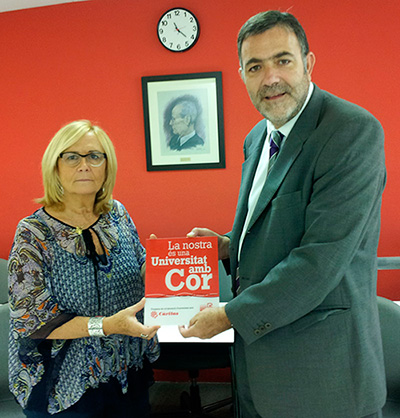Collaboration agreement with Cáritas to help people at risk of social exclusion join the workforce
EADA is yet again involving itself in a just cause, stemming from its commitment to Corporate Social Responsibility policies that contribute to a fairer and more sustainable world. On this occasion it has signed a collaboration agreement with Cáritas Diocesana de Barcelona to take part on the “Feina amb cor” (Job with a Heart) project, an initiative that got off the ground in December 2013 and which aims to improve the employability of people at risk of social exclusion.
In this way EADA has become a “University with a heart”, making its resources and its talent available in order to accomplish this social goal. More specifically, EADA has agreed to raise awareness among its student body around this social issue as well as to publicise Caritas’ campaigns, by organising conferences to raise awareness concerning the precarious predicaments these people are in, exhibitions, training forums, debate forums and talks on social issues. In addition it will further collaboration on the part of its students in training activities in the field of new technologies and digital literacy, as well as job placement projects.
Furthermore, the two institutions have agreed to meet every six months to plan the year’s activities. The first meeting has been scheduled for October.

In the photo, Montse Padilla, general secretary of Cáritas Diocesana de Barcelona, hands a plaque to Miquel Espinosa, EADA’s general director, which certifies that EADA is a “University with a heart”.
A project ‘with a heart’
“A job with a heart” is a job accompaniment service run by Cáritas for people who have been unemployed for over one year, who have families to support and who are no longer eligible for unemployment benefit or whose unemployment benefit is about to run out. Over 1200 people have joined the programme to date, 330 of whom have already found a job. 45% of them are women and 39% are over 45 years old. 76% receive no social benefits and 40% have been unemployed for over three years.
This accompaniment is intensive and holistic and each person is offered a wide range of resources to improve their employability status. For example, they have access to seminars, interview simulations and job clubs. What’s more, they have an advisor who offers them customised counselling in order to get a job contract and help them to seek employment autonomously.
